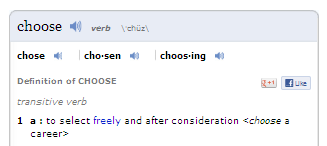For most people, pro-choice means a woman’s right to choose what she wants to do with her own body. Webster’s defines it simply as “favoring the legalization of abortion1.” But do either of those statements accurately define the term “pro-choice”?
The literal meaning of the two words combined suggests a highly different concept – pro: to be in favor of, and choice: the power to select freely and after consideration.

Do women facing unplanned pregnancy today truly possess the power to choose freely? The concept would look something like this:
- Her healthcare provider would adhere to a strict code of medical ethics (i.e., the provider’s ability to present unbiased information would not be influenced by financial gain).
- All of her options would be equally and thoroughly represented (i.e., the materials/information presented would not be influenced by the provider’s personal/political agenda or beliefs).
- She would be given time to fully consider the cost of each of the options available to her (i.e. would be required to delay her decision for a short period after counseling and before making her decision (this is not required by NYS2)).
- She would remain free from any type of coercion while in the process of making her decision – (i.e., not pressured/influenced by her doctor, pro-life/pro-choice propaganda, the father, family, friends, co-workers, etc.).
To be “pro-choice” is to be an advocate for the empowerment of women through unbiased information and uncoerced decisions. Only within that environment is a woman truly free to choose.
1 Merriam-Webster (2012). Retrieved from: http://www.merriam-webster.com/medical/pro-choice
2 The Guttmacher Institute (2012) State Policies in Brief, Counseling and Waiting Periods for Abortion. Retrievd from: http://www.guttmacher.org/statecenter/spibs/spib_MWPA.pdf